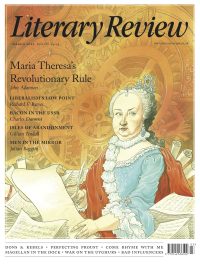Elizabeth Lowry
Stephen King Meets Henry James
Burning Questions: Essays & Occasional Pieces – 2004–2021
By Margaret Atwood
Chatto & Windus 496pp £20
At the age of eighty-two, Margaret Atwood, as she reminds us with some dismay in her third collection of essays and occasional pieces, has become a cultural ‘icon’. She is of course the author of one of the most famous books of the late 20th century, The Handmaid’s Tale (1985). Her nightmarish vision of a totalitarian society in which women have lost all civil and reproductive rights has been adapted for film, opera, the stage and as an immensely successful television series. It has since been followed by a long-awaited sequel, the Booker Prize-winning The Testaments (2019).
To be an icon, though, suggests a certain fixity, if not downright rigidity. It’s the sort of label we apply to someone who has had their say and is now past it. And Atwood, on the evidence of this darting, irreverent record of her thoughts over the last

Sign Up to our newsletter
Receive free articles, highlights from the archive, news, details of prizes, and much more.@Lit_Review
Follow Literary Review on Twitter
Twitter Feed
Under its longest-serving editor, Graydon Carter, Vanity Fair was that rare thing – a New York society magazine that published serious journalism.
@PeterPeteryork looks at what Carter got right.
Peter York - Deluxe Editions
Peter York: Deluxe Editions - When the Going Was Good: An Editor’s Adventures During the Last Golden Age of Magazines by Graydon Carter
literaryreview.co.uk
Henry James returned to America in 1904 with three objectives: to see his brother William, to deliver a series of lectures on Balzac, and to gather material for a pair of books about modern America.
Peter Rose follows James out west.
Peter Rose - The Restless Analyst
Peter Rose: The Restless Analyst - Henry James Comes Home: Rediscovering America in the Gilded Age by Peter Brooks...
literaryreview.co.uk
Vladimir Putin served his apprenticeship in the KGB toward the end of the Cold War, a period during which Western societies were infiltrated by so-called 'illegals'.
Piers Brendon examines how the culture of Soviet spycraft shaped his thinking.
Piers Brendon - Tinker, Tailor, Sleeper, Troll
Piers Brendon: Tinker, Tailor, Sleeper, Troll - The Illegals: Russia’s Most Audacious Spies and the Plot to Infiltrate the West by Shaun Walker
literaryreview.co.uk